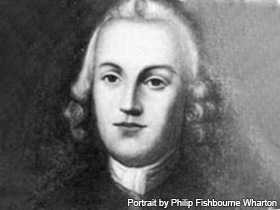You are here

5/10/1730 - 7/14/1779
One-time Kings Prosecutor for Pennsylvania and uncle of Betsy Ross, George Ross signed the Declaration of Independence.
George Ross was born in New Castle, Delaware, on May 10, 1730. He was a lawyer, a politician, and a patriot. He practiced law in Lancaster, Pennsylvania. He was also a member of the First and Second Continental Congress, the First Constitutional Convention, and a number of other government committees in Pennsylvania. In 1776, he was one of the founding fathers who signed the Declaration of Independence. Ross died on July 14, 1779.
On May 10, 1730, a George Ross was born to Reverend George Ross, rector of Immanuel Church, and Catherine Van Gezel in New Castle, Delaware. George Ross was born into a large family and was educated at home along with his siblings. When Ross was 18 years old, he went to Philadelphia, Pennsylvania, to study law at his brother John's law office. In 1750, after Ross had studied for only two years, he was admitted to the Pennsylvania Bar at the age of 20. The next year, in 1751, Ross started his own law practice in Lancaster, Pennsylvania. In that same year he married Ann Lawler, who was one of his first clients. George and Ann had three children.
In 1756, Ross was chosen to represent the crown of England as the King's prosecutor in Pennsylvania. He held this position until 1768 when he was elected to provincial legislature as one of the representatives from Pennsylvania. George Ross was originally a strong supporter of the King of England. However, during his time serving in the legislature he began to change his opinions and reconstruct his point of view. As a representative he was able to better understand the colonial struggle against the crown. With this new insight Ross became a colonial sympathizer and patriot.
In 1774, Ross was elected to the First Continental Congress. Only one man received more votes than Ross and that man was Benjamin Franklin. Membership in the First Continental Congress proved to be one of Ross's first patriotic acts. In 1775, he was removed from the provincial legislature because of his affiliations with the Continental Congress. In the same year, Ross worked on a number of other colonial committees. He was a member of the Lancaster County Committee of Observation and served on the Pennsylvania Committee of Public Safety, where he wrote regulations for the Constitutional Convention, rules concerning the military, and an ordinance on treason and punishment. George Ross always helped his country. When tensions between England and the colonies became violent, Ross showed his true patriotism by serving as a Colonel in the Continental Army.
In 1776, Ross was elected Vice President of the First Constitutional Convention for which he had drafted regulations the year before. That same year, he was elected to the Second Continental Congress on July 20. On August 2, George Ross became an American hero and a patriot for all time. On that day he joined in signing Thomas Jefferson's document that gave America its freedom, the Declaration of Independence. Ross was one of five members who signed the Declaration who were also members of Saint Andrew's Society of Philadelphia, a society founded to protect Scottish immigrants in the city.
In 1777, Ross was forced to resign from the Continental Congress because of health problems. However, his legacy did not end there. In 1778, he was elected Vice President of the Pennsylvania Assembly, and he also accepted a judge position in the Pennsylvania Court of Admiralty where he presided over Olmstead et al. v. Rittenhouse's Executors. This was a landmark case about the conflict between state and federal governments.
Unfortunately, Ross was only in office for the Court of Admiralty for three months. George Ross died from gout on July 14, 1779.
Though George Ross was a historical and patriotic figure, most people are more familiar with his nephew's wife, Betsy Ross, who is famous for creating the original flag of the United States.
- Signed Declaration of Independence
- Anderson, K. "George Ross 1730-1779." Magic City Morning Star. 14 July 2004. 24 Feb. 2006 <>http://www.magic-city-news.com/History_37/George_Ross_1730-1779_17841784....
- Henderson, Rodger C. "George Ross." American National Biography. Feb. 2000. American Council of Learned Societies. 22 Jan. 2006 <>http://www.anb.org/articles/01/01-00796.html>.
- Szumanski, L. A. "Saint Andrew's Society of Philadelphia 1749-1979." The Historical Society of Pennsylvania. Feb. 1998. 24 Feb. 2006
- "George Ross." Colonial Hall. 28 Jan. 2006 <>http://www.colonialhall.com/ross/ross.php>.
- Whitney, David C. Founders of Freedom in America: Lives of the Men Who Signed the Declaration of Independence. 1964.
Photo Credit: Philip Fishbourne Wharton . "Portrait of George Ross." 1873. Portrait. Licensed under Public Domain. Cropped to 4x3, filled background. Source: Original portrait by Benjamin West. Source: Wikimedia.
